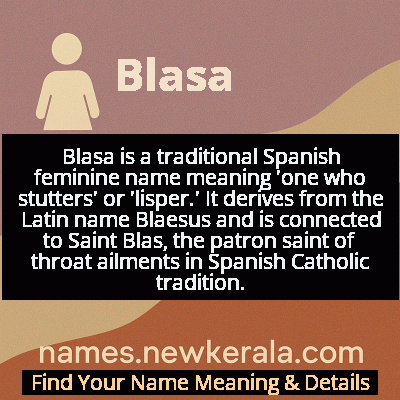Blasa Name Meaning & Details
Origin, Popularity, Numerology Analysis & Name Meaning of Blasa
Discover the origin, meaning, and cultural significance of the name BLASA. Delve into its historical roots and explore the lasting impact it has had on communities and traditions.
Name
Blasa
Gender
Female
Origin
Spanish
Lucky Number
8
Meaning of the Name - Blasa
Blasa is a traditional Spanish feminine name meaning 'one who stutters' or 'lisper.' It derives from the Latin name Blaesus and is connected to Saint Blas, the patron saint of throat ailments in Spanish Catholic tradition.
Blasa - Complete Numerology Analysis
Your Numerology Number
Based on Pythagorean Numerology System
Ruling Planet
Saturn
Positive Nature
Ambitious, efficient, realistic, and authoritative.
Negative Traits
Materialistic, stressed, confrontational, and can be overly ambitious.
Lucky Colours
Dark blue, black.
Lucky Days
Saturday.
Lucky Stones
Blue sapphire, amethyst.
Harmony Numbers
2, 4, 6.
Best Suited Professions
Business leaders, managers, financial services, law enforcement.
What People Like About You
Leadership, determination, organizational skills.
Famous People Named Blasa
Blasa de la Fuente
Religious Figure
Spanish nun known for her charitable works and founding a convent school for underprivileged girls
Blasa García
Folk Artist
Traditional Spanish embroiderer whose works are preserved in regional museums of Castile
Blasa Hernández
Community Leader
Organized rural women's cooperatives in Andalusia during the post-Civil War period
Blasa María
Educator
Pioneered early childhood education methods in rural Spanish communities
Name Variations & International Equivalents
Click on blue names to explore their detailed meanings. Gray names with will be available soon.
Cultural & Historical Significance
The name Blasa represents a connection to traditional Spanish Catholicism and rural heritage. In many communities, naming a daughter Blasa was seen as invoking the protection of Saint Blas against throat diseases and speech difficulties. The name carries echoes of pre-modern Spain, when names were often chosen for their religious significance and protective qualities rather than aesthetic appeal. It reflects a time when physical characteristics or challenges were sometimes commemorated through naming practices, turning potential vulnerabilities into sources of spiritual strength.
Throughout Spanish colonial history, the name traveled to the Americas, where it became established in regions with strong missionary presence. The cultural significance of Blasa lies in its embodiment of folk Catholicism, rural values, and the Spanish tradition of naming children after saints for protection and blessing. It represents a worldview where names served as both identity and spiritual armor in a challenging world.
Extended Personality Analysis
Women named Blasa are often perceived as having a quiet strength and resilience that comes from overcoming challenges. The name's association with speech difficulties historically suggests personality traits of thoughtfulness, careful consideration before speaking, and deep listening skills. They tend to be observant individuals who process information thoroughly before expressing opinions, making them valued advisors and confidantes.
Despite any historical associations with speech challenges, Blasas often develop exceptional communication skills through compensation and determination. They typically possess strong inner conviction and spiritual depth, drawing from the name's religious connections. Their personalities often blend traditional values with practical wisdom, making them pillars in their families and communities. The journey implied by the name's meaning frequently results in individuals who are particularly empathetic toward others facing difficulties, with a special understanding of the power of perseverance and the importance of giving people time to find their voice.
Contemporary bearers of the name often exhibit a blend of traditional grounding and modern adaptability. They tend to be deeply connected to family heritage while possessing the flexibility to navigate changing social landscapes. The name suggests someone who values authenticity over superficiality, and who understands that true communication involves listening as much as speaking. These personality traits reflect the historical journey of the name itself—from acknowledging a challenge to transforming it into a source of unique strength and character.
Modern Usage & Popularity
In contemporary times, Blasa has become quite rare as a given name, primarily found among older generations in rural Spanish communities or as a family name passed down through generations. The name experienced a significant decline in popularity throughout the 20th century as Spanish naming trends shifted toward more modern and internationally influenced names. However, there has been a minor resurgence in recent years among families seeking to honor ancestral traditions or reconnect with their rural heritage, particularly in regions like Extremadura, Castile, and Andalusia. In Latin America, the name appears occasionally in communities with strong Spanish colonial roots, particularly in Mexico, Guatemala, and parts of Central America. Modern usage often involves combining it with more contemporary middle names to balance tradition with current naming preferences, and it's sometimes chosen by parents interested in reviving traditional Spanish names with historical depth and character.
Symbolic & Spiritual Meanings
Symbolically, Blasa represents the transformation of perceived weakness into strength and the power of overcoming communication barriers. The name embodies the concept that what might initially appear as a limitation can become a source of unique power and insight. It symbolizes deep listening, thoughtful speech, and the wisdom that comes from careful observation rather than rapid reaction. The connection to Saint Blas adds layers of spiritual protection, healing, and the sanctity of the voice—both literal and metaphorical. Blasa carries the symbolic weight of rural Spanish heritage, connecting bearers to traditions of faith, community, and the quiet dignity of agricultural life. The name serves as a reminder that true communication involves not just speaking but understanding, and that sometimes the most powerful voices are those that have learned the value of silence before speaking. It symbolizes the journey from impediment to eloquence, from challenge to mastery, making it a name that carries profound metaphorical meaning about personal growth and the discovery of one's authentic voice.

